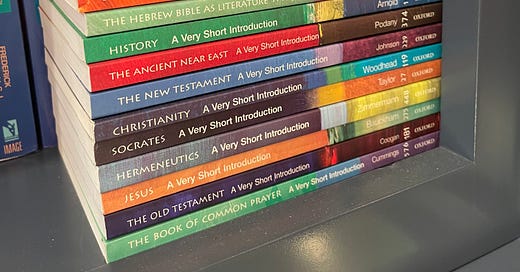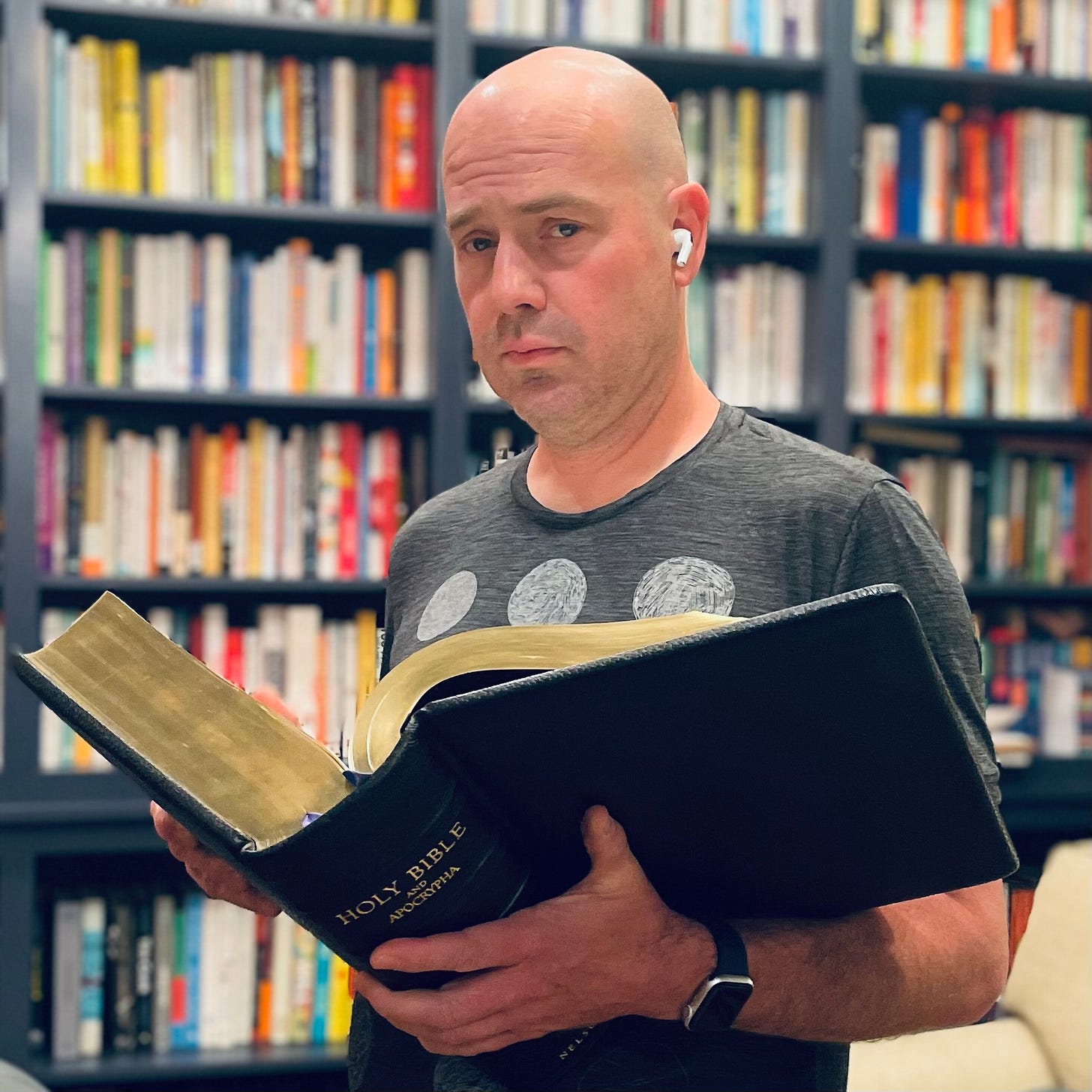Bookish Diversions: Massive Learning in a Tiny Package
Very Short Introductions, Essential Knowledge, Ancient Wisdom, Little Red and Green Books, More
Books come in all shapes and sizes. I possess, for instance, an enormous lectern Bible that makes me happy just to hold, though you might not gather my true mood from the shot my twelve-year-old captured several months back. The text is big enough to read from across the room. And it’s stuffed with extra bits to boot, namely the so-called Apocrypha. It’s large.
But I also have a thing for small titles, especially big series of little books. I have several collections I really enjoy. I shared that list on Twitter last week to positive response. “Love this!” said Cale Clarke about the post. “These collections look to be 🔥 . . . maybe you can review each set on your Substack!”
Great idea! As you either know or will soon discover, I love sharing what I’m reading. Essayist Margaret Renkl sympathizes. “To read something you love is to become . . . a missionary,” she says. “You shove that book into a beloved’s hands. You harangue your book club to choose it though it isn’t your turn to choose. You are desperate for somebody to talk with about it.”
I don’t know that this rises to the level of desperation, but here I am—shoving a whole list of books into your hands. Let me know what you think.
Very Short Introductions

I learned about this series from my friend, Jeremy Lott. Slender as a finger and no bigger than a hand, Oxford University Press’ Very Short Introductions cover just about every topic known to the species. More than 700 titles hit subjects stretching from abolitionism to Zionism. If you’re looking for an entry point into a massive area of study or some faintly lit corner the world, Very Short Introductions are a great place to start.
“Each volume provides an authoritative and engaging assessment of a concept, field, or body of work, drawing out the central ideas, themes, and approaches,” according to the publisher. “Our expert authors combine facts, analysis, new insights, and enthusiasm to make often challenging topics highly readable to develop your core knowledge. . . . Whatever your area of study, whatever the topic that fascinates you, the series is an indispensable and accessible guide that will enrich your understanding.”
Essential Knowledge

If you’re looking for something in a technical field and perhaps a bit more complete than a Very Short Introduction, your best bet could be MIT Press’ Essential Knowledge series. I’ve read several of these in the last year and have found them reliably informative and engaging. Whether it’s the nature of beliefs, espionage, GPS, quantum entanglement, hunting, or placebos, they’ve got something to say on it—but not just anything to say.
“In today’s era of instant information gratification, we have ready access to opinions, rationalizations, and superficial descriptions,” the publisher explains. “Much harder to come by is the foundational knowledge that informs a principled understanding of the world. Essential Knowledge books fill that need. Synthesizing specialized subject matter for nonspecialists and engaging critical topics through fundamentals, each of these compact volumes offers readers a point of access to complex ideas.”
One great thing about small books captured by MIT’s summary is how they serve the primary challenge of learning. Learning is easier when we can build a knowledge base into which we can integrate new information. But where to begin? A few books like these clustered around related topics enable you to lay a solid foundation for future discovery. Without a foundation, potential new knowledge often slips right by us because there’s no way to incorporate it—we just forget it. Potentially worse: we think we know something we really don’t.
Not a subscriber? Take a moment and sign up. It’s free, and I’ll send you my top-ten quotes about books in your welcome email.
Ancient Wisdom for Modern Readers

Kanye West recently admitted that he doesn’t read books—in fact that he’s never read a book. I find that hard to believe, but whatever. “Reading is like eating Brussels sprouts for me,” he explained. It’s a great comparison, actually, because Brussels sprouts are also amazing: it’s all in how you prepare them. And that’s the genius of this series from Princeton University Press.
Classical texts are sometimes tough to get into, but Ancient Wisdom for Modern Readers offers fresh translations in handy packages that invite rather than intimidate. Like the two series covered above, these books are presented topically—everything from grieving to giving, time management to anger management, farming to friendship—as how-to manuals. A sampling:
How to Flourish (Aristotle)
How to Do the Right Thing (Seneca)
How to Say No (Diogenes and the Cynics)
How to Tell a Story (Aristotle)
How to Tell a Joke (Cicero)
How to Keep an Open Mind (Sextus Empiricus)
I’ve actually reviewed one from the series here already: How to Innovate (Aristotle, primarily, translated by Armand D’Angour).
“Ancient Wisdom for Modern Readers presents the timeless and timely ideas of classical thinkers in lively new translations,” says the publisher. “Enlightening and entertaining, these books make the practical wisdom of the ancient world accessible for modern life.” But what if you want to go deeper or read more broadly in the classics than repacks like these? There’s probably nothing better than . . .
Loeb Classical Library

“Access to all that is important in Greek and Latin literature.” That’s the big promise contained in the little books of the Loeb Classical Library. There are Loebs by the legion at this point, covering: “Epic and lyric poetry; tragedy and comedy; history, travel, philosophy, and oratory; the great medical writers and mathematicians; those Church fathers who made particular use of pagan culture—in short, our entire classical heritage. . . .”
The green covers are Greek and the red Latin. Each volume features text of the original language on the left page and the translation on the right. They update the translations from time to time to ensure they’re fresh and readable. And each comes with a thorough introduction to provide context for what’s inside.
Lives of Great Religious Books

As you might tell from the titles in my stacks of Very Short Introductions or Loebs, religion occupies a lot of my thinking. Books haven’t always played a part in religions, historically speaking. But in many traditions they ground the entire practice and belief system. For me that means religious texts are worth not only reading but reading about, and Princeton University Press’ Lives of Great Religious Books presents a great way to acquire familiarity with key religious texts.
The series contains books about the core texts—say, the books Genesis, Job, or the Song of Solomon. Along with those it features books that build on those core texts: Augustine’s Confessions, Aquinas’ Summa, Calvin’s Institutes, even C.S. Lewis’ Mere Christianity. Says the publisher,
These books examine the historical origins of texts from the great religious traditions, and trace how their reception, interpretation, and influence have changed—often radically—over time. As these stories of translation, adaptation, appropriation, and inspiration dramatically remind us, all great religious books are living things whose careers in the world can take the most unexpected turns.
These books are by eminent scholars for general readers. One of the benefits of these titles—like books in the rest of these series—is they present enough information for a working knowledge of a text but ample discussion to guide future discovery if that’s where your whims take you.
Popular Patristics

I don’t read much contemporary theology these days. I prefer the older stuff, but I’m like the Roman Casca in Shakespeare’s Julius Caesar: “It was Greek to me.” Thankfully, there are scholars aplenty these days producing modern translations of Greek church fathers. The best among them are published in St. Vladimir’s Seminary Press’ Popular Patristics series.
The Popular Patristics series aims to provide readable and accurate translations of a broad range of early Christian literature to a wide audience—from students of Christian history and theology to lay Christians reading for spiritual benefit. Recognized Patristic scholars provide short but comprehensive and clear introductory essays according to their specializations for each volume.
Many of these books are foundational Christian texts, including the letters of Ignatius, Athanasius’ On the Incarnation or Irenaeus’ On the Apostolic Preaching, and Gregory the Great’s Book of Pastoral Rule. Some are presented in full. Others are arranged by topic, for instance, orations on a certain theme—a good example being a collection of texts by Tertullian, Cyprian, and Origen on the Lord’s Prayer.
A key benefit of reading books in a series is that publishers have provided a track to run on. If you’re just getting started on a topic or ready to really go deep, the right series can help. And what’s not to love when they fit in your pocket?
Thank you for reading! Please share Miller’s Book Review 📚 with a friend.
If you’re not a subscriber, take a moment and sign up. It’s free, and I’ll send you my top-ten quotes about books in your welcome email. They won’t improve your looks, but they’ll make you sound more interesting at parties. Thanks, again!





Joel, why don't you just go ahead and admit it? This is your day job, right? How DO you do this each week? I stand and applaud each of your posts I wade through because of their tight and concise and helpful content.
This post, though, is many posts in one (each of these subheads could've been its own post)! I had hoped to order a full set of the Very Short Introductions, with the naïveté that it will take me a very short time to read them. There are 754 volumes.
Good stuff, as always. I'm not surprised to learn that we share similar interests. What we don't share—unfortunately for me—is adequate shelf space. I'm likely to die under a collapsed stack at this point.